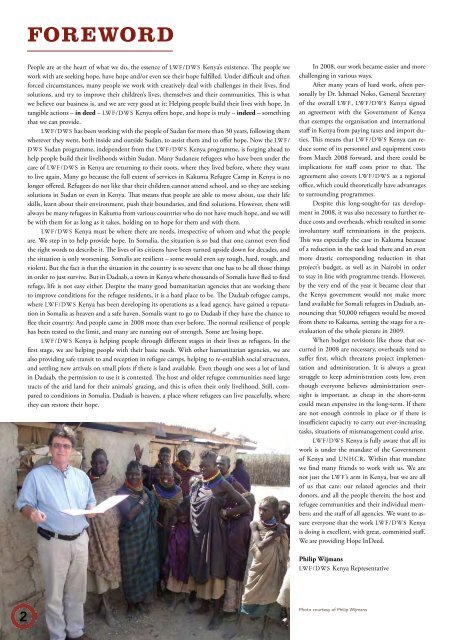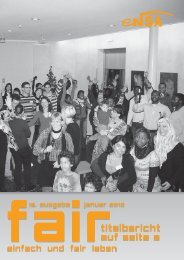Create successful ePaper yourself
Turn your PDF publications into a flip-book with our unique Google optimized e-Paper software.
FOREWORDPeople are at the heart of what we do, the essence of LWF/DWS <strong>Kenya</strong>’s existence. The people wework with are seeking hope, have hope and/or even see their hope fulfilled. Under difficult and oftenforced circumstances, many people we work with creatively deal with challenges in their lives, findsolutions, and try to improve their children’s lives, themselves and their communities. This is whatwe believe our business is, and we are very good at it: Helping people build their lives with hope. Intangible actions – in deed – LWF/DWS <strong>Kenya</strong> offers hope, and hope is truly – indeed – somethingthat we can provide.LWF/DWS has been working with the people of Sudan for more than 30 years, following themwherever they went, both inside and outside Sudan, to assist them and to offer hope. Now the LWF/DWS Sudan programme, independent from the LWF/DWS <strong>Kenya</strong> programme, is forging ahead tohelp people build their livelihoods within Sudan. Many Sudanese refugees who have been under thecare of LWF/DWS in <strong>Kenya</strong> are returning to their roots, where they lived before, where they wantto live again. Many go because the full extent of services in Kakuma Refugee Camp in <strong>Kenya</strong> is nolonger offered. Refugees do not like that their children cannot attend school, and so they are seekingsolutions in Sudan or even in <strong>Kenya</strong>. That means that people are able to move about, use their lifeskills, learn about their environment, push their boundaries, and find solutions. However, there willalways be many refugees in Kakuma from various countries who do not have much hope, and we willbe with them for as long as it takes, holding on to hope for them and with them.LWF/DWS <strong>Kenya</strong> must be where there are needs, irrespective of whom and what the peopleare. We step in to help provide hope. In Somalia, the situation is so bad that one cannot even findthe right words to describe it. The lives of its citizens have been turned upside down for decades, andthe situation is only worsening. Somalis are resilient – some would even say tough, hard, rough, andviolent. But the fact is that the situation in the country is so severe that one has to be all those thingsin order to just survive. But in Dadaab, a town in <strong>Kenya</strong> where thousands of Somalis have fled to findrefuge, life is not easy either. Despite the many good humanitarian agencies that are working thereto improve conditions for the refugee residents, it is a hard place to be. The Dadaab refugee camps,where LWF/DWS <strong>Kenya</strong> has been developing its operations as a lead agency, have gained a reputationin Somalia as heaven and a safe haven. Somalis want to go to Dadaab if they have the chance toflee their country. And people came in <strong>2008</strong> more than ever before. The normal resilience of peoplehas been tested to the limit, and many are running out of strength. Some are losing hope.LWF/DWS <strong>Kenya</strong> is helping people through different stages in their lives as refugees. In thefirst stage, we are helping people with their basic needs. With other humanitarian agencies, we arealso providing safe transit to and reception in refugee camps, helping to re-establish social structures,and settling new arrivals on small plots if there is land available. Even though one sees a lot of landin Dadaab, the permission to use it is contested. The host and older refugee communities need largetracts of the arid land for their animals’ grazing, and this is often their only livelihood. Still, comparedto conditions in Somalia, Dadaab is heaven, a place where refugees can live peacefully, wherethey can restore their hope.In <strong>2008</strong>, our work became easier and morechallenging in various ways.After many years of hard work, often personallyby Dr. Ishmael Noko, General Secretaryof the overall LWF, LWF/DWS <strong>Kenya</strong> signedan agreement with the Government of <strong>Kenya</strong>that exempts the organisation and internationalstaff in <strong>Kenya</strong> from paying taxes and import duties.This means that LWF/DWS <strong>Kenya</strong> can reducesome of its personnel and equipment costsfrom March <strong>2008</strong> forward, and there could beimplications for staff costs prior to that. Theagreement also covers LWF/DWS as a regionaloffice, which could theoretically have advantagesto surrounding programmes.Despite this long-sought-for tax developmentin <strong>2008</strong>, it was also necessary to further reducecosts and overheads, which resulted in someinvoluntary staff terminations in the projects.This was especially the case in Kakuma becauseof a reduction in the task load there and an evenmore drastic corresponding reduction in thatproject’s budget, as well as in Nairobi in orderto stay in line with programme trends. However,by the very end of the year it became clear thatthe <strong>Kenya</strong> government would not make moreland available for Somali refugees in Dadaab, announcingthat 50,000 refugees would be movedfrom there to Kakuma, setting the stage for a reevaluationof the whole picture in 2009.When budget revisions like those that occurredin <strong>2008</strong> are necessary, overheads tend tosuffer first, which threatens project implementationand administration. It is always a greatstruggle to keep administration costs low, eventhough everyone believes administration oversightis important, as cheap in the short-termcould mean expensive in the long-term. If thereare not enough controls in place or if there isinsufficient capacity to carry out ever-increasingtasks, situations of mismanagement could arise.LWF/DWS <strong>Kenya</strong> is fully aware that all itswork is under the mandate of the Governmentof <strong>Kenya</strong> and UNHCR. Within that mandatewe find many friends to work with us. We arenot just the LWF’s arm in <strong>Kenya</strong>, but we are allof us that care: our related agencies and theirdonors, and all the people therein; the host andrefugee communities and their individual members;and the staff of all agencies. We want to assureeveryone that the work LWF/DWS <strong>Kenya</strong>is doing is excellent, with great, committed staff.We are providing Hope InDeed.Philip WijmansLWF/DWS <strong>Kenya</strong> Representative2Photo courtesy of Philip Wijmans



